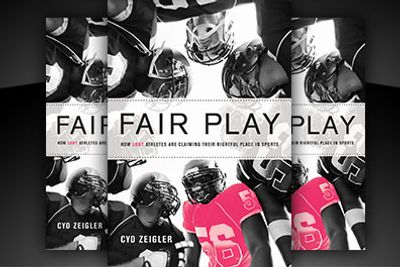By Terri Schlichenmeyer, January 2017 Issue.
As long as your team wins. That’s all that matters, isn’t it – just that they win? You don’t care what they ate for breakfast. You don’t give a rat what they weighed this morning. And, as in the new book Fair Play: How LGBT Athletes are Claiming Their Rightful Place in Sports by Cyd Zeigler (pictured), you don’t care who they sleep with.
Less than a generation ago, if a professional athlete came out publicly as gay, it was cause for controversy (at best) and harassment (at worst), from the stands and from the locker room. In today’s arena, however, gay and lesbian athletes enjoy wider acceptance from fans and followers; sadly, the intolerance that formerly came from the bleachers can now just as easily come from behind the scenes.
It used to start in the early years, and while there are still some problems with hazing in high school locker rooms, Zeigler indicates that many public schools are more inclusionary of gay athletes and staff than they’ve ever been. High schools are also less willing to put up with incidents of homophobia.
In college sports, though, something different emerges: teasing (which is mentally depleting, despite that it’s ostensibly meant for bonding), hazing (of which Zeigler demands an end), anti-gay rhetoric (at religious institutions) and general torment are all practiced and are psychically hurtful to anyone, but particularly to gay athletes.
Conversely, lesbians and transgender athletes’ experiences almost bookend those of gay men. On one hand, lesbian athletes receive unusually high fan-tolerance, which may be because higher numbers of lesbian athletes are matter-of-factly uncloseted; indeed, when a female athlete comes out as lesbian, it’s rarely newsworthy anymore. On the far other hand, many transgender athletes still receive fierce backlash.
Yet, times are changing, albeit gradually. Teammates and staff who voice homophobia might now receive punishment along with negative fan reaction. Mere humanity makes a difference, too. The biggest change, though, seems to come from fans, and from their quiet acknowledgement that a player’s sexuality doesn’t matter at all to an enjoyment of the game itself.
With bullying as such a hot topic in schools and media these days, it was only a matter of time (and it’s about time) that someone tackled the subject in context of the sporting world. Even so, I was rather disappointed to see that Fair Play, although its subtitle indicates that it’s about LGBT athletes, is more about gay males in sports. I suppose one could argue that most professional sports are male-dominated, but Zeigler, though he admits his focal point, truly needed more about lesbians, and bisexual and transgender players. That slim coverage left me wanting.
Still, it’s hard not to be fascinated with what’s definitely not your usual game coverage. Zeigler is a nationally-known sports writer, and this book is filled with insider peeks, big-name examples, astonishing incidents, and up-and-comer encouragement – therefore, ultimately, what’s in this book overshadows what’s not, and it becomes something that I think will be enlightening for fans both straight and gay. Despite a little lacking, if you’re an armchair cheerleader, then, Fair Play will really score.
